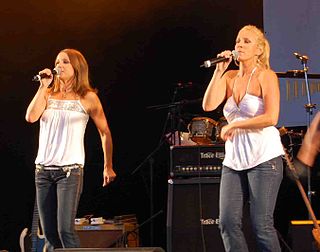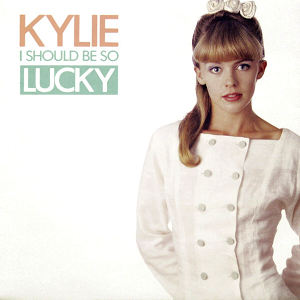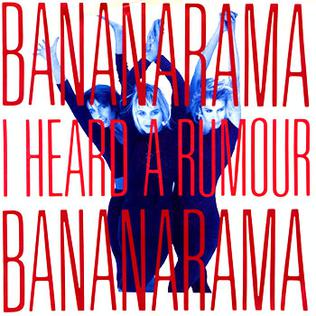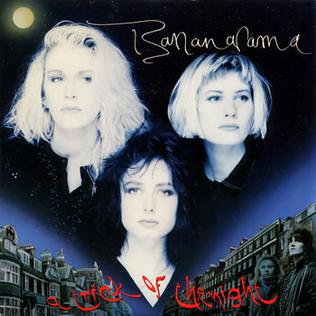
Bananarama is a British-Irish girl group formed in London in 1980. The group, originally a trio, consisted of friends Sara Dallin, Siobhan Fahey, and Keren Woodward. Fahey left the group in 1988 and was replaced by Jacquie O'Sullivan until 1991, when the trio became a duo. Their success on both pop and dance charts saw them listed in the Guinness World Records for achieving the world's highest number of chart entries by an all-female group. Between 1982 and 2009, they had 30 singles reach the Top 50 of the UK Singles Chart.

"Venus" is a song by Dutch rock band Shocking Blue, released as a single in the Netherlands in the summer of 1969. Written by Robbie van Leeuwen, the song topped the charts in nine countries.

"I Should Be So Lucky" is a 1987 song performed by Australian singer and songwriter Kylie Minogue from her debut studio album Kylie (1988). Released on 29 December 1987 by Mushroom Records and PWL Records, the song became a worldwide breakthrough hit; its image of Minogue on the front cover was shot by David Levine. The song was written and produced by Stock Aitken Waterman for Minogue, and they went on to produce Minogue's first four studio albums.

"Je ne sais pas pourquoi" (English: "I Do Not Know Why"), also known as "I Still Love You (Je ne sais pas pourquoi)" in Australia and New Zealand, is a song by Australian recording artist and songwriter Kylie Minogue from her debut studio album Kylie (1988). Released as a single on 10 October 1988 by PWL, the song has subsequently appeared on most of Minogue's hits compilations including Greatest Hits (1992), Ultimate Kylie (2004) and, most recently, Step Back in Time: The Definitive Collection, released in 2019. Like most of Minogue's material between 1988 and 1992, it was written and produced by Stock Aitken Waterman.

Wow! is the fourth studio album by English group Bananarama, released on 4 September 1987 by London Records. The album was entirely produced and co-written with the Stock Aitken Waterman production trio. Tensions between group member Siobhan Fahey and Stock, Aitken and Waterman regarding songwriting input and lyrical content prompted Fahey's departure from Bananarama five months after its release. The album reached number 26 on the UK Albums Chart and number 44 on the US Billboard 200, while peaking at number one in Australia. The album was certified gold by the British Phonographic Industry (BPI) on 3 February 1988.

"Got to Be Certain" is a song by Australian singer Kylie Minogue from her debut studio album, Kylie (1988). Written and produced by English songwriting and record production trio Stock Aitken Waterman (SAW), the song was released as the second single from Kylie in most territories outside Australia, and was released on 2 May 1988 in Australia and the United Kingdom. In Australia, "Got to Be Certain" was Minogue's third single release. "Got to Be Certain" was a commercial success, peaking at number one in Minogue's native Australia and number two on the UK Singles Chart.

"I Heard a Rumour" is a song by English girl group Bananarama from their fourth studio album, Wow! (1987), and was released on 29th June 1987 as the album's lead single. It became a hit in UK where it reached the top 20, but was more successful in North America, where it peaked within the top five.

"Brand New Lover" is a song recorded by the English pop band Dead or Alive. It was the lead single released from the band's third studio album, Mad, Bad and Dangerous to Know on Epic Records. It achieved international success when released as a single in 1986, but while it was a major hit in a number of territories, including the United States and Japan, in the UK the single significantly underperformed, failing to crack the top 20.

"Together Forever" is a song recorded by English singer-songwriter Rick Astley and released by RCA and BMG as the fourth single from his debut album, Whenever You Need Somebody (1987). The song reached number two in the United Kingdom, behind Neighbours star and fellow Stock Aitken Waterman artist Kylie Minogue's debut single "I Should Be So Lucky". The single was a worldwide hit, reaching number one on the Billboard Hot 100 on 18 June 1988, becoming Astley's second and final US chart-topper, also topped the charts in Canada, Ireland and Spain, and was a top ten hits in many European countries.

"This Time I Know It's for Real" is a song by American singer-songwriter Donna Summer, released on February 13, 1989, as the first single from her 14th studio album, Another Place and Time (1989), by Atlantic Records and Warner Bros. Records. Like the rest of the album, the song was written and produced by the British Stock Aitken Waterman (SAW) team, though Summer also had a hand in writing this song.

"Nathan Jones" is a song by American girl group the Supremes from their twenty-third studio album, Touch (1971). It was released on April 15, 1971, as the album's lead single. Produced by Frank Wilson and written by Kathy Wakefield and Leonard Caston, "Nathan Jones" was one of eight top-40 entries the Supremes recorded after its original frontwoman, Diana Ross, left the group for a solo career.

"More Than Physical" is a song by English girl group Bananarama from their third studio album, True Confessions (1986). It was released on 11 August 1986 as the album's third single. It was co-written and produced by the Stock Aitken Waterman (SAW) trio. A reworked version of the song was released as the single version.

"A Trick of the Night" is a mid-tempo ballad recorded by English girl group Bananarama. It was written and produced by Steve Jolley and Tony Swain and released as the final single from Bananarama's album True Confessions.

"Love in the First Degree" is a song by English girl group Bananarama from their fourth studio album, Wow! (1987). It was released on 28 September 1987 as the album's second single, except in the United States, where it was released in 1988 as the third single. The track was co-written and produced by the Stock Aitken Waterman (SAW) trio. It achieved major success in the UK and Australia, and also peaked within the top 20 in many European countries, but, unlike "I Heard a Rumour", it reached only the lower end of the top 50 in the US.

"I Can't Help It" is a song by English girl group Bananarama from their fourth studio album, Wow! (1987). It was released on 29 December 1987 as the album's third single, except in the United States, where it was the second single, and Australia, where it served as the fourth single. The track was co-written and produced by the Stock Aitken Waterman (SAW) trio. The single peaked at number 20 in the UK singles chart, number 27 on the Australian ARIA chart, and number 47 on the U.S. Billboard Hot 100.

"Love, Truth and Honesty" is a song by English girl group Bananarama from their first greatest hits album, Greatest Hits Collection (1988). Co-written and produced by the Stock Aitken Waterman (SAW) trio, the song was released on 12 September 1988 by London Records as the album's lead single. It achieved a moderate success, peaking out of the top 20 in the majority of countries where it was released. The music video was produced by Big TV!.

"'Movin' On" is a song written and performed by English girl group Bananarama. Released on 17 August 1992, it was the first single from their sixth album, Please Yourself (1993). It was produced by Mike Stock and Pete Waterman, two-thirds of the Stock Aitken Waterman (SAW) trio who had produced a number of Bananarama's past hits.

"Happenin' All Over Again" is a song written and produced by Stock Aitken & Waterman (SAW) for American singer Lonnie Gordon's first album, If I Have to Stand Alone (1990). The song mixed SAW's Europop sound with the blooming Italo house music which was becoming big in the UK charts at the time. It was released as the album's second single on January 15, 1990, and reached number four on the UK Singles Chart, but this 1990 version was never released in the US. A different version of the song was included on Gordon's 1993 album Bad Mood, and this version was released as a US single in 1993, peaking at number 98 on the Billboard Hot 100 and at number one on the Billboard Dance chart. In 1998, Gordon recorded the song for a second time and released it as a single.

"That's the Way It Is" is a song by British pop duo Mel and Kim that was featured on the soundtrack album of Coming to America, starring Eddie Murphy. The song was written and produced by Stock Aitken Waterman (SAW). The single, released by Supreme Records and PolyGram peaked at number ten in the United Kingdom, becoming their fourth consecutive top ten hit.

"Say I'm Your Number One" is a song by English singer Princess, released in 1985 as the lead single from her self-titled debut studio album (1986). Written and produced by Stock Aitken Waterman (SAW), the song peaked at number seven on the UK Singles Chart. In the United States, it reached number 20 on Billboard's Hot Black Singles chart, while it reached the top ten in the UK and several of European and Oceanian countries.




















